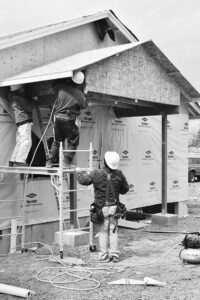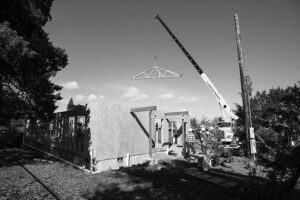By Melissa Wagoner


In a typical year the North Willamette Valley Habitat for Humanity builds one or perhaps two houses.
“We’ve always been a onesie-twosie organization,” Kari Johnson, executive director since 2019, confirmed. “But that’s one of the things they said when they brought me on is that they wanted to grow.”
That is primarily because, with housing costs throughout Oregon on the rise, many families can no longer afford to purchase – and in many cases even rent – a home.
“Median home prices have increased 72 percent from 2016 to 2018,” Johnson noted. “And in Silverton rent is increasing faster than the income levels.”
Add to these issues the fact that, according to Johnson, the average income for a family of three is only $65,000 and the need for assistance from entities like Habitat for Humanity becomes clear.
“In the city of Silverton, I’m on the Affordable Housing Taskforce and the housing need analysis shows a huge need for housing for seniors and even the younger generation,” Johnson said. Adding, “Our kids grow up in this community and they can’t afford to
live here.”
One of the sticking points, Johnson speculated, is the desire to keep the community small when, in reality, it has no choice but to grow.
“In Silverton there’s a projected need of more than 1,100 housing units to keep up with population growth,” Johnson said. “All of this ties into House Bill 2001.”
That bill, passed by Oregon Legislature in 2019, is aimed at reducing urban sprawl, while at the same time providing more housing choices, within city-limits, through the construction of traditional structures – namely duplexes in the initial stage, expanding into triplexes, quadplexes, cottage clusters and townhouses by June 30, 2022 in larger metropolitan areas.
“The governor mandated that if you’re over 10,000 people you have to accommodate affordable housing in your codes,” Johnson said.
Which is why, between the need for more housing in general and the need for more affordable housing in particular, Johnson and Habitat for Humanity have recently decided to level up, aiming to build more houses than ever before.
“Our plan is to go to five homes a year,” Johnson stated. “We’re building one home now, it’s in the process.”
That home is at the west end of Pine Street, near the entrance to Silverton High School. There it will be joined over the course of the next three years by 17 others.
“We had an opportunity when some land opened up and was available,” Johnson said. “But with 18 homes coming up, we’re going to need the help.”
That’s because Habitat for Humanity’s ability to offer low-cost housing is virtually impossible without a strong volunteer base.
“The benefit is, we’re able to build a house for $200,000 instead of $350,000,” Johnson said. “It makes it more affordable than going conventional.”
Affordable, but not free.
“The misconception is we give away homes,” Johnson said. “We definitely don’t give them the home.”
In fact, the initial application process is similar to the one used for any mortgage loan – namely credit score and income.
“We look for a credit score of 620 or better,” Johnson said. “And we don’t want the payment to be more than 30 percent of their income.”
Long after the home is built, the new owners will still need to pay the mortgage, utilities and costs of upkeep.
“We’ve been talking to Sustainable Silverton to make sure we incorporate ways to be sustainable,” Johnson added. Noting that this step is an important part of doing their part to keep construction as environmentally friendly as possible and keeping the homes cost effective in the long term.
“The last thing we want is for them to have a huge electric bill,” she said.
It’s just one way that Habitat for Humanity forms a partnership with homeowners. Another is through the “sweat equity” agreement.
“They have to commit to doing 500 hours of service,” Johnson said. “That can be on their own home, someone else’s home or at the ReStore. The kids also get credit for good grades.”
The sweat equity agreement is about more than just including the families in the building process.It’s also about ensuring their continued involvement in the community as a whole.
“The family has to be able to partner with us, be a good advocate and a good community member,” Johnson said. “We do a rigorous background check.”
This kind of endorsement is also important because 18 homes isn’t just a development, it’s a neighborhood, replete with single family detached houses and multiple family attached homes as well as new sidewalks and a bike lane.
“We pay for that,” Johnson said, refuting a rumor that the additional houses will put a strain on the infrastructure of
the area.
While building has already begun on the first house, there are plenty of homes still up to be built and application opportunities are posted on Facebook at NWVHabitat4Humanity.
“Our application process isn’t always open,” Johnson acknowledged. “We can only open it for a 30-day period. But we try to get things out on the Silverton Facebook page and on our website or you can call and we can put your name on a contact list.”
For those in the community looking to get involved, Habitat for Humanity is always accepting volunteers, monetary donations and donated building supplies.
“Free labor is part of the way we are able to do this,” Johnson said. “We are very reliant on volunteers. And people can also make donations on our website.”
North Willamette Valley Habitat for Humanity
For information on upcoming projects, housing applications or to donate visit:
www.nwvhabitat.org
www.facebook.com/NWVHabitat4Humanity
Or call 503-845-2434